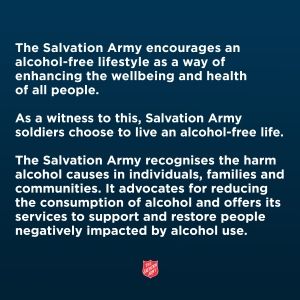Alcohol in Society - reducing the human toll

Alcohol in Society - reducing the human toll
The Salvation Army has developed an international position statement on Alcohol in Society.
 Alcohol in Society – The Salvation Army International Position Statement.
Alcohol in Society – The Salvation Army International Position Statement.
This International Positional Statement (IPS) is intriguing because it addresses both individual health and community wellbeing. It draws a distinction between the individual alcohol-free lifestyle choice of Salvationists and the reduction of alcohol consumption by society at large. It is a subtle, yet important contrast.
wholeness
The Hebrew concept of shalom is applicable here. More than the absence of war or conflict, shalom joins salvation, health, healing, wholeness and wellness with physical, mental and spiritual fulfilment – both for the individual and the community. The individual Salvationist’s commitment to abstinence from alcohol expresses a behavioural lifestyle that aims for maximised personal wholeness.
Individuals are strengthened towards this wholeness with the mutual support of other Salvationists, holding each other accountable and encouraging each other.
The community of faith known as The Salvation Army commits to a reduction in alcohol consumption and an overall increase in community wholeness through modelling, education, advocacy and the provision of rehabilitation programs and support groups. Some people abstain from alcohol for health reasons.
principle
The negative global and societal impact of the alcohol industry leads some people to make a principled choice to abstain from alcohol consumption. This is one factor for the collective Salvation Army. The choice of abstinence is an expression of its Christian faith and values.
Any principled protest is likely to be in the minority but can be, nevertheless, powerful in its impact. When communal momentum gathers, wholesale change can be effected. For example, note the relatively recent Western rejection of nicotine, where smoking has gone from being socially acceptable to legally prohibited in many public settings. Some people abstain from alcohol out of principle.
vow
One component of spiritual formation is the relationship between tangible human appetite and intangible spiritual values. An individual, seeking to nurture and strengthen spirituality, will often willingly commit to sacred self-denial. This essentially makes a statement – to the individual, to the community and to God – that healthy spirituality is more important than bodily appetites. A public vow or commitment helps this.
There is some similarity with athletes and artists who make self-denying commitments for their sport or art form. The Salvation Army offers a voluntary commitment to abstinence from alcohol for individuals through the signing of the Soldier’s Covenant, a way to express the idea of a vow. Some people abstain from alcohol as a spiritual commitment.
summary
While the consumption of alcohol is a normal part of society, the carnage wreaked is vast – from functional alcoholism to full-blown addiction, from cirrhosis of the liver to drink-driving fatalities, from spousal and child abuse to binge-drinking brawls, from work absenteeism to spiralling medical costs for entire nations.
This IPS affirms the alcohol-free healthy choice made by individual Salvationists and upholds the combined advocacy and care offered by The Salvation Army to reduce the alcohol-induced human toll in the community.